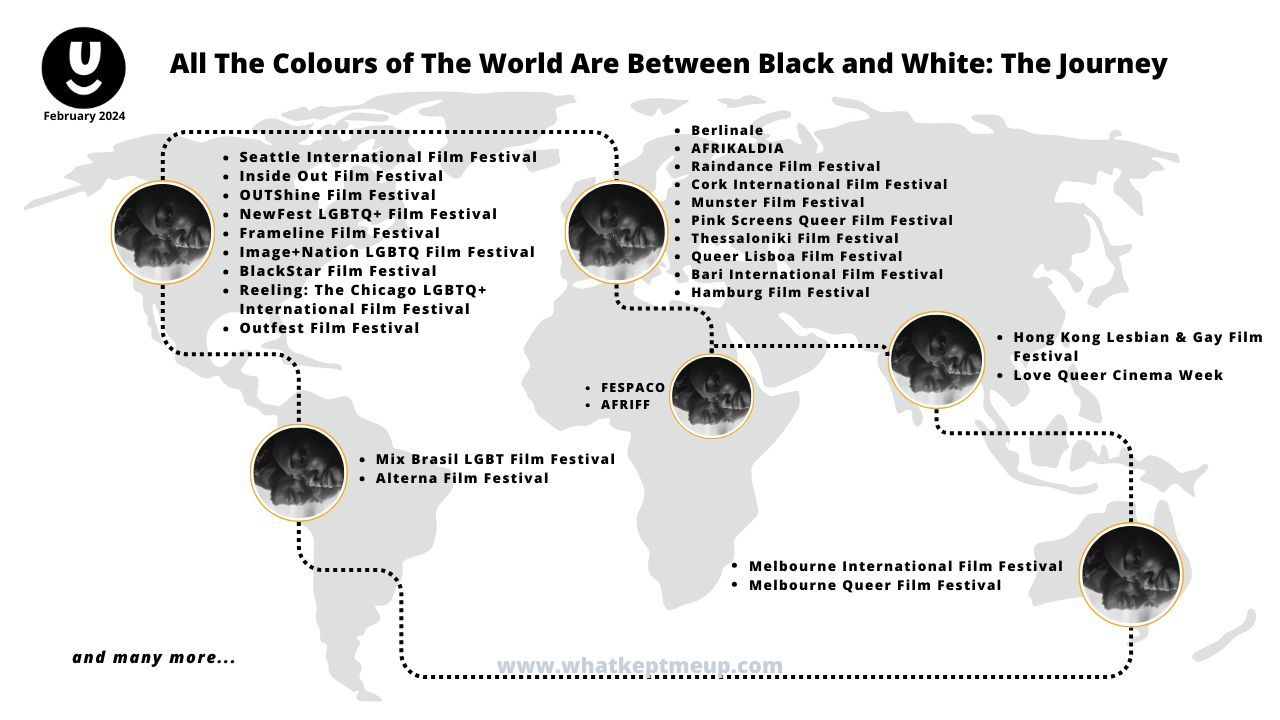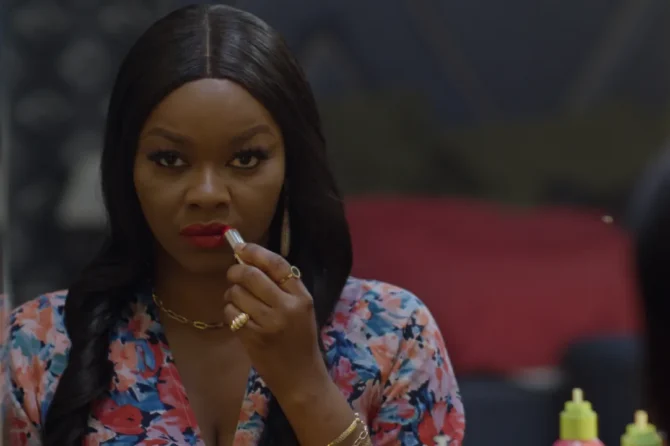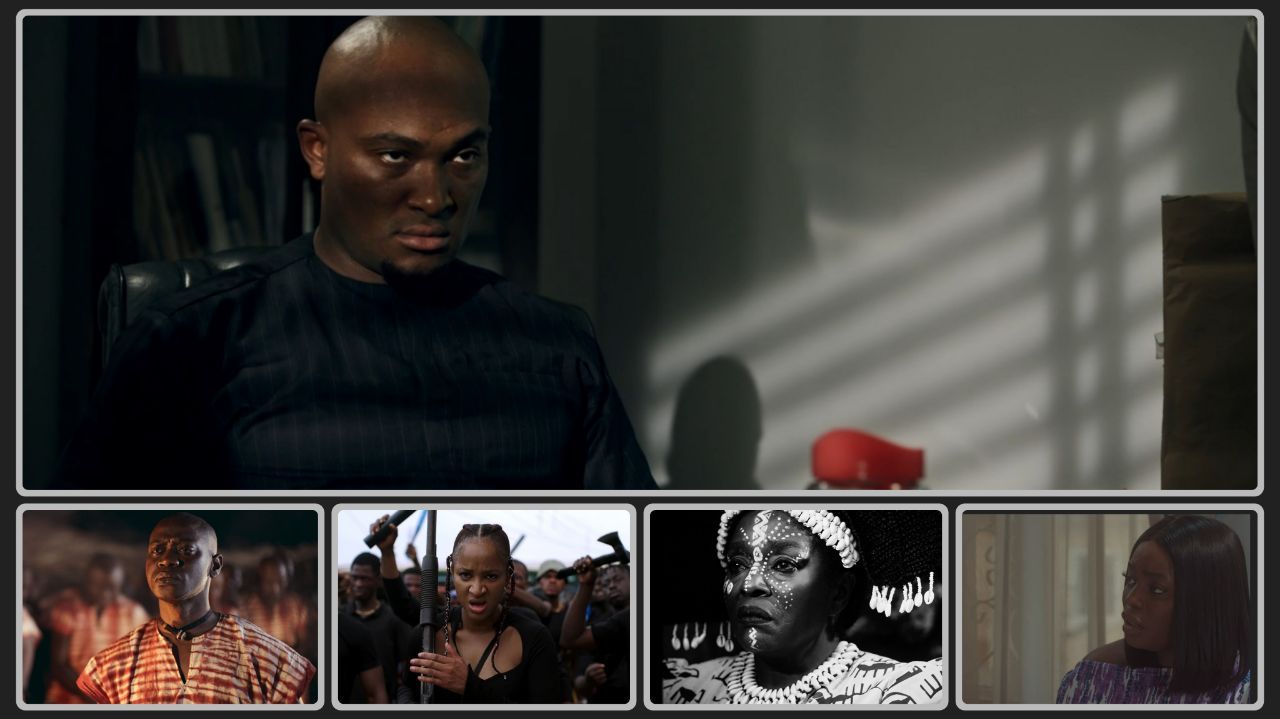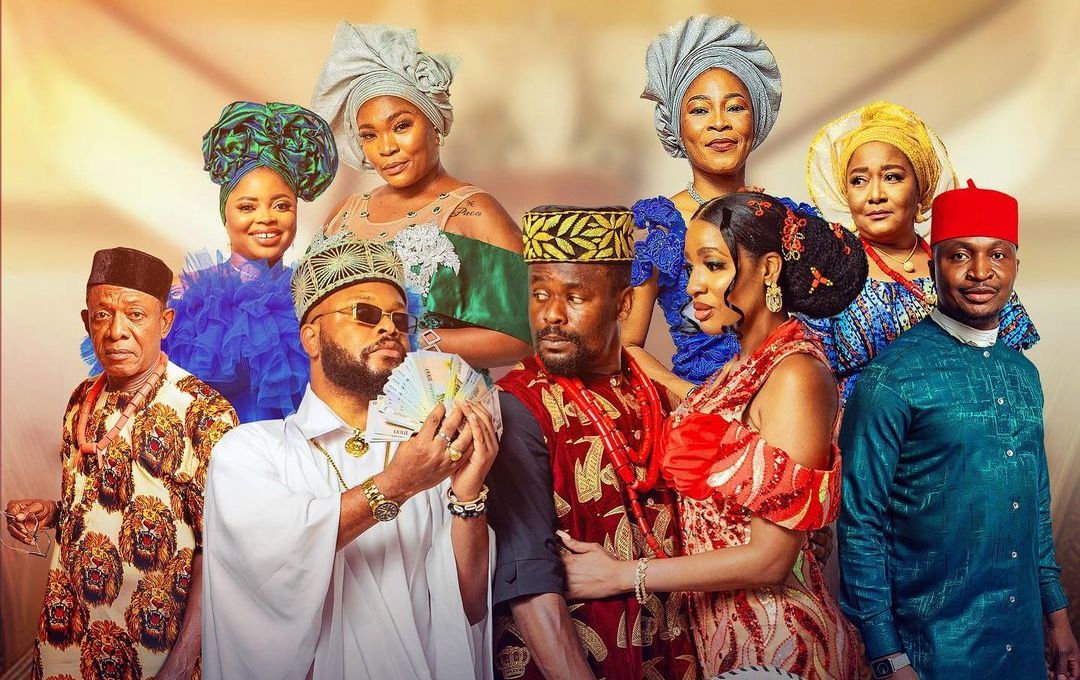When Babatunde Apalowo set out to make his debut feature film, All the Colours of the World Are Between Black and White, he had one destination in mind – Berlinale.
“For me, Berlinale was the goal, there are just quite very few film festivals that are as big as Berlinale,” he told WhatKeptMeUp. “The kind of films they accept felt like what All The Colours could be even at an early stage.”
In comes Damilola Orimogunje, the producer, a close friend and no stranger to the festival circuit. The two met at a script-writing competition in 2014 and bonded over their shared interests in filmmaking which quickly blossomed into a professional relationship and close friendship. They worked together on several projects including Orimogunje’s short film Losing My Religion (2018) and the award-winning For Maria (2020). So, it’s no wonder that he quickly bought into Apalowo’s dream.
“We didn’t stumble on it [Berlinale] at the end of the film, we knew that was the goal. While we were filming there was a conscious effort to ensure that most of what was done in the film met the standard and that level which we wanted the film to go,” Orimogunje stated.
To achieve his daring dream, Apalowo approached another old friend and fellow filmmaker Imafidon Gift Jesurobo-Owie. They had collaborated on a short film with the latter as the producer and had made plans to work on more projects, so working on All the Colours of the World Are Between Black and White was a no-brainer.
While Imafidon initially needed some convincing when Apalowo pitched his idea, he eventually saw the vision after reading the page-turner in about an hour and came on board as a co-producer on the project.
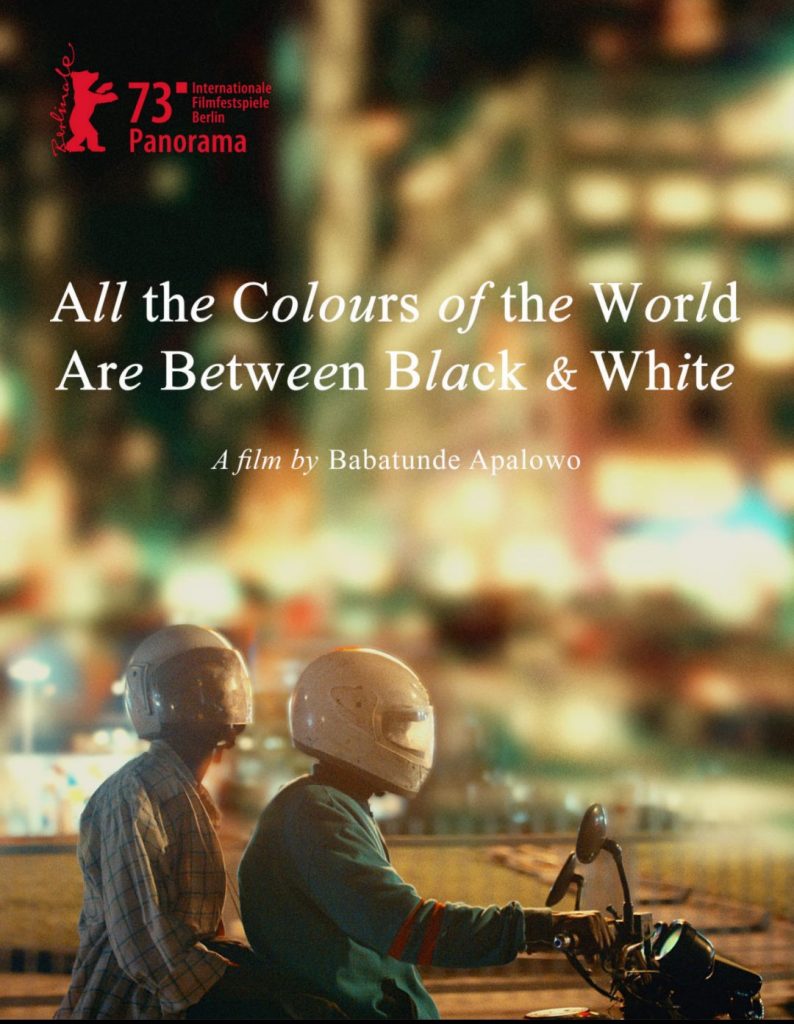
Together, they set sail for one of the biggest film festivals from Lagos, Nigeria and the UK (Apalowo’s base). Two years later, on February 18, 2023, precisely, they would walk to the stage as the crowd stood on their feet cheering them on after their global premiere in Berlin and later to accept the Teddy Award for Best Feature Film at the same festival.
So far, Apalowo’s dream has screened at over 85 film festivals across the world, picking up awards along the way. His continuous global success, in a year that also birthed Mami Wata, paves the way for more indie Nigerian filmmakers and shows that there is more than one roadmap to making a critically acclaimed film.
On his wins (beginning with premiering at Berlinale), Apalowo said, “For me, it is a dream come true, especially because we went through many tribulations and trials to make the film. Normally, it is difficult to make a film in Nigeria but it was particularly very difficult to make this film. Then we got selected at Berlinale, which was the very first time I saw the film on a big screen so it was quite unforgettable. I remember that I was so nervous and I kept looking out for anyone that stood up, wondering if they were leaving but they would only step out to pee and return. No one left the hall, people stayed from the beginning to the end. When we were introduced to come on stage, there was a roaring round of applause. To brag a little bit, I was in the room with Steven Spielberg. Having the opportunity to present my debut film with my friends was great. So, starting like that and having the momentum remain throughout the festival circuit is memorable.”
The journey to becoming Nigeria’s second Berlinale appearance after Esiri brothers’ Eyimofe in 2020 began with a conversation between Apalowo and Orimogunje at the former’s place five years before All the Colours of The World Are Between Black and White was made. They were discussing upcoming projects when Apalowo brought up the idea, which went by the working title, Bambino, at the time.
It was initially the story of a photographer going around Lagos to capture the memories of his dead parent with the city of Lagos as a character. The idea immediately appealed to Orimogunje. “Think of the Before series, where you have the main characters walking around the city, but in this case, it is an exploration of Lagos. We had often discussed the fact that Lagos has been used so much in films, but we hadn’t exactly seen it in a cinematic way,” Orimogunje explained.
It took almost three years after that conversation for Apalowo to figure out the story and write the script for the movie that follows the tender, restrained relationship between Bambino (Tope Tedela) and Bawa (Riyo David), who meet in Lagos and start to develop feelings for one another. The result being a compelling, relatable story of two men trying to find their place in the world while struggling with how they see themselves, one more than the other.
With the script out of the way, the indie filmmaker, who is the writer, director and producer went to Orimogunje with some money of his own to get the ball rolling. The initial idea was to make a self-funded movie but the funds soon ran out, which led to Orimogunje pitching the movie to Ezra Olubi, the co-founder and Chief Technical Officer (CTO) of PayStack.
“When Tunde came to me, he had an amount of money which I knew was never gonna shoot the film, but it was a good start. I’m very good friends with Ezra’s friend. So I pitched to her but she said she couldn’t come on this but thinks Ezra might be interested. We pitched to him and by the following week, we were talking and getting the money,” Orimogunje stated.
In addition to the funding, the producers got by with a merry band of dreamers, people who were enamoured by the relatable story with interesting themes of identity, love, acceptance, and the complexities that come with being different. The cast and crew willingly pitched in to do whatever it took to get the movie to Berlinale in spite of the taboo subject matter.
Describing the mindset of the cast, crew and collaborators, Jesurobo-Owie said, “I think the film sold itself because it made people want to be part of it, which helped. People working for less than what they would have collected and people doing stuff for free if it was possible for them. Even when we had not completed the film, we were already so sure that we were going to Berlinale which got people interested.”
Asked why he was sure about All the Colours of the World Are Between Black and White going to Belinale, the director, Apalowo, simply stated, “I knew I wanted to get into Berlinale. It was my goal.”
One man’s gutsy dream spurred everyone on, as people went all out to get the movie ready to premiere at Berlinale in a remarkable turn of events.
“Talking to people was a bit easy and a couple of people saw the potential in the film. It was a big ask for them, but we are grateful for the sacrifices and the belief they have in this project and how far it has gone. With the post-production, which was done here in the UK, we had to go pitch to people, tell them our dream and funny enough, the story resonated with many people who decided to work on it for little or nothing,” Jesurobo-Owie added.
While most projects usually have funding as their only challenge, Apalowo’s film had one more issue to contend with—the casting. With the controversial nature of the script, casting in a country with anti-gay laws presented a major challenge.
In Orimogunje’s words, “We had some challenges, especially for the role of Bawa. Our first two, or three choices turned down the role for different reasons. The most consistent reason was the subject matter and being unsure of how it would be received. I think some people were trying to quantify the eventual part of the film which they did not know and also the backlash that might come with the project.”
Jesurobo-Owie shed some more light on the difficult challenging casting process for the movie. “I remember one prominent actor who was so interested but he had a lot of issues with the script. To cut the long story, it was a lot of posting on his part and we eventually got the message that he wasn’t going to do it. Another prominent actor was interested but wanted more action, a lot of running and fighting. Another project came, and he jumped at that. A couple of other people pulled out at the last minute. We had a couple of disappointments,” he added.
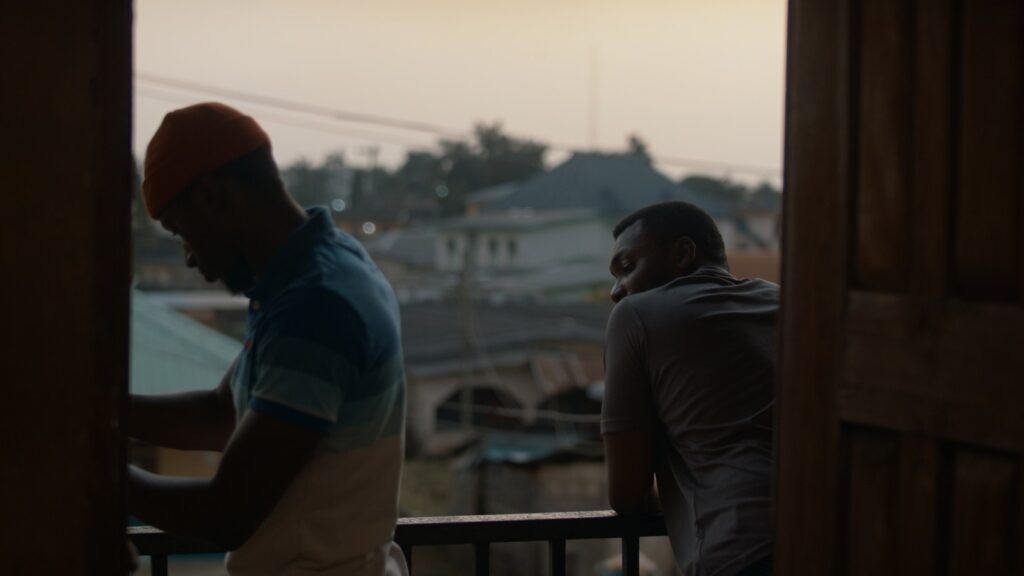
After casting the main human characters, the director had one character to figure out — Lagos. With Lagos as a major part of the story, Apalowo faced an interesting challenge. “I think casting Lagos was the most difficult decision ever,” he admitted, “because how do you cast a city? The greatest challenge was showing Lagos without showing people’s faces. It worked out well because some elements were pushed to the background. We had to select settings in Lagos that resonate with the story, portraying its history and architecture authentically.”
With casting done, production began in November 2021. The shoot lasted for about two weeks with additional photography six months later in 2022, followed by post-production, which lasted for a year.
Then came the hard part, waiting to see if All the Colours of the World Are Between Black and White would get into Berlinale after sharing it with one of the programmers. While waiting to see if their dream would come true, the team received some negative news that threatened everything.
Reminiscing on that tense period, Orimogunje said, “We were just waiting back for the good or bad news. We also sent it to a couple of other festivals. The funny thing is that we got a No from one of the big festivals. It was a crazy three days as we reflected on the rejection but it was during that same time that we got an email from Berlinale letting us know that we were selected. Of course, that changed everything and cemented what we wanted for the project.”
Apalowo’s Berlinale selection made the director the second homegrown Nigerian to screen at the festival. There, he received a roaring ovation from the audience and later, the Teddy Award for Best Feature Film. Every screening after the opening night was packed as people clamoured to see the Nigerian movie that kept getting rave reviews.
On the reactions from the Berlinale audience, Orimogunje said, “We weren’t sure how it would be received despite getting to Berlinale. Then something interesting happened. We had our premiere and the entire night was filled with praises and that happened for the next five screenings. First of all, they were all sold out and the entire industry at the festival kept talking about our film. We would go to parties at night and people were just randomly talking about a small film from Nigeria called All the Colours of the World Are Between Black and White that they saw during the day that was so good. It meant a lot to a lot of people which was the icing for me. As filmmakers, aside from the praises, you want to make films that are quite impactful, and that resonate with people deeply and I feel like that was what we were able to achieve. Being able to stand there and get all these remarks was a proud moment for me and the team.”
An overview of the global festival run can be seen below:
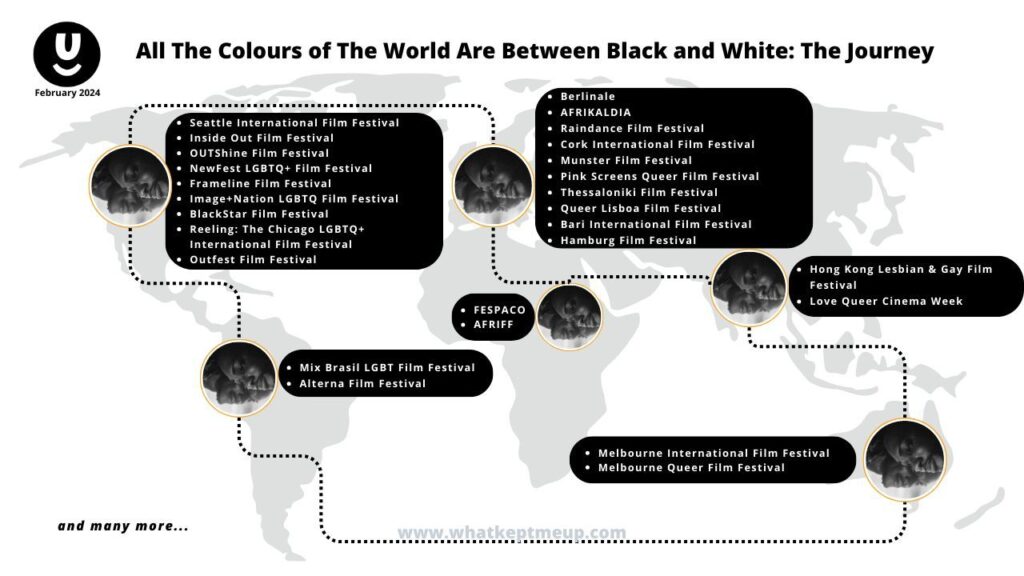
Africa
- Festival panafricain du cinéma et de la télévision de Ouagadougou (FESPACO)
- Africa International Film Festival (AFRIFF), picking up the Special Jury Prize Award
Europe
- World Premiere at Berlin International Film Festival (Berlinale) in Berlin, Germany, wins the Teddy Award
- África Imprescindible in Pamplona, Spain
- AFRIKALDIA, African Film Festival of the Basque Country in Spain, winning Best Soundtrack Award
- LesGaiCineMad, Madrid International LGBT Film Festival in Spain
- Raindance Film Festival in UK, winning the Best Cinematography Award.
- CinemÀfriques in Barcelona
- Valladolid International Film Festival in Valladolid, Spain
- Lovers Film Festival in Italy
- Pink Apple Film Festival in Switzerland
- Gay Film Festival Freiburg in Germany
- Sprouts Film Festival in Netherlands
- Sinema Transtopia Cinema Berlin in Germany
- XPOSED Queer Film Festival Berlin in Germany
- Kaleidoskop Film Festival in Austria
- New Horizons in Poland
- Roffa Mon Amour Film Festival in Netherlands
- Queer Film Festival Utrecht in Netherlands
- Finnish Premiere at Helsinki International Film Festival
- African Film Festival Cologne and Stuttgart in Germany
- Cormorán Film Festival in Spain
- MIX Milano Film Festival in Italy
- Soho Cinema Amsterdam Film Festival in Netherlands
- Cyprus LGBTIQ+ Film Festival in Cyprus
- Queerfilm Festival Bremen in Germany
- Irish Premiere at Cork International Film Festival in Ireland
- Ghent Film Festival in Belgium
- Queer Film Fest Rostock, Rostock, Germany
- Queer Film Festival Munich in Germany, winning Jury Award
- Luststreifen Film Festival Basel in Switzerland
- Geneve Premiere at Everybody’s Perfect International Queer Film Festival in Switzerland
- Hamburg Film Festival in Germany
- Perlen Queer Film Festival Hannover, Germany
- Gender Bender Film Festival in Italy
- Cinema Queer LGBTQ Film Festival in Sweden
- Merlinka Film Festival in Serbia
- Bari International Film Festival in Italy
- African Film Festival in Munich, Germany
- Ankara International Film Festival in Turkey
- Munster Film Festival in Germany
- Thessaloniki Film Festival in Greece
- Queer Lisboa Film Festival in Portugal
- Festival des 3 Continents in France
- Pink Screens Queer Film Festival in Belgium
- Holebi Film Festival in Belgium
- Bern Premiere at Queersicht Film Festival in Switzerland
- Ljubljana LGBT Film Festival in Slovenia
North America
- Seattle International Film Festival
- Canadian Premiere at Inside Out Film Festival in Canada
- Frameline Film Festival, winning Out in the Silence Award
- Outfest Film Festival in Los Angeles
- BlackStar Film Festival in Philadelphia
- Out On Film in Atlanta, winning Best Director and Best International Films Awards
- Nollywood Film Festival in US
- OUTShine Film Festival in Fort Lauderdale, Florida
- New York Premiere at NewFest LGBTQ+ Film Festival in US
- Reeling: The Chicago LGBTQ+ International Film Festival
- Out Film Connecticut in US
- Image+Nation LGBTQ Film Festival in Canada
Australia
- Melbourne International Film Festival
- Melbourne Queer Film Festival
East Asia
- Hong Kong Lesbian & Gay Film Festival in China
- Love Queer Cinema Week in China
South America
- São Paulo Premiere at Mix Brasil LGBT Film Festival in Brazil
- Alterna Film Festival in Lima, Peru
The world premiere at Berlinale set the stage for the globe-trotting film to become one that audiences and film critics can’t get enough of. Months later, the film eventually made its way home for a screening at the Africa International Film Festival (AFRIFF); a happy moment for the director.
In Apalowo’s words, “AFRIFF stands out for me specifically because I’ve always maintained that it’s an authentic Nigeria story made by Nigerians that needs to be seen by Nigerians. It was the very first time it was seen publicly in Nigeria and I think it’s also poetic because it was my second time seeing the film with the audience after Berlinale. I was able to vibe with the audience because a lot of the nuances I believe went over the heads of the foreign audience was gotten by Nigerians. For instance, there was a particular scene that was quite very Nigerian close to the end of the film which made everybody clap. To be honest, I don’t have a negative feedback. The reception to the film has been awesome.”
Orimogunje echoed similar sentiments about the general reception to the groundbreaking movie. “The feedback that has stood out to me is how much people praise the visual storytelling of the film and compare it to some of our inspiration,” he revealed. “There are some filmmakers that Tunde and I look up to and revere their work like Wong Kar-wai. Getting compared to filmmakers like that, I think it’s quite interesting. I love it so much because it testifies to our growth as filmmakers and then to the possibility of what we are capable of. I tend to think myself and Tunde share the same style visually, so it means a lot to know that people are watching and that we are making a statement that is here to stay.”
While All the Colours of the World Are Between Black and White has continued to record many achievements, it has also had a few lows, especially on the continent. For Jesurobo-Owie, the one that comes to mind is the total snub of the film by the Africa Movie Academy Awards (AMAA). “They had always pushed new films when the founder, Peace Anyiam-Osigwe, was alive. I was surprised we didn’t get nominated,” he said.
Like Jesurobo-Owie, Orimogunje’s grief is also with an African establishment, this time, the AFRIFF. “I think the only one would be recently at AFRIFF where we were to do a Q&A, but the organisation wasn’t the strongest. We didn’t have the Q&A which would have allowed us to share and connect because I feel like the essence of screening the film is the Q&A and the conversations but we didn’t have that,” he shared.
While the movie has received a lot of praise abroad for its sensitive subject matter, this is the exact reason why it might never have a theatrical release in Nigeria, one of the factors that eliminates the film from a potential Oscar run as Nigeria’s submission this year and in the future.
Peeling back the curtain on the resistance the movie has faced from local film exhibitors, Orimogunje said, “For this year’s Oscars, we did not submit and that’s because we didn’t meet all the criteria. The top one was to have its theatrical release in your own country. Before we made the film, we knew it would be difficult for us to screen the film in Nigerian theatres because of its theme even though it doesn’t actually explore sexual relationships. We spoke to some of the exhibitors but to date, it’s still tedious, nobody is saying no, and people are being political. It’s not surprising because we figured that we might not exactly have that opportunity while we were planning the distribution format for the film. It becomes ineligible for us to meet the criteria of the Oscars submission.”
Despite this setback, there are plans to make the film available to Nigerians and the general audience via streaming platforms sometime this year. The team is working on an African deal and a potential US deal as well as a theatrical release in France and Denmark in early 2024 to add to the several distribution deals the movie has landed in Europe.
With the film’s winning streak carrying into 2024, Babatunde Apalowo’s All the Colours of the World Are Between Black and White stands out as one of the breakout Nollywood stars of 2023, making space for daring filmmakers to forge their paths with the right dream and the team of collaborators. It is a win for the indie space in Nollywood and proof that there is room for more diverse stories.
An overview of their production path and awards:
- The first draft in early 2021
- Rewrites, casting and pre-production that lasted for eight months
- Shooting kicks off in November 2021. Lasts for about two weeks
- Additional photography six months later in 2022 for about two or three days
- Post-production for a year
- Berlinale selection in late 2022
- Global premiere at Berlin in February 2023
- Teddy Award For Best Feature Film at Berlinale in February
- Italy’s Coccinelle Film Sales acquired world rights in February
A Nigerian release date remains unknown.
Share your thoughts in the comments section or on our social media accounts.
Sign Up: Keep track of upcoming films and TV shows on your Google calendar.

